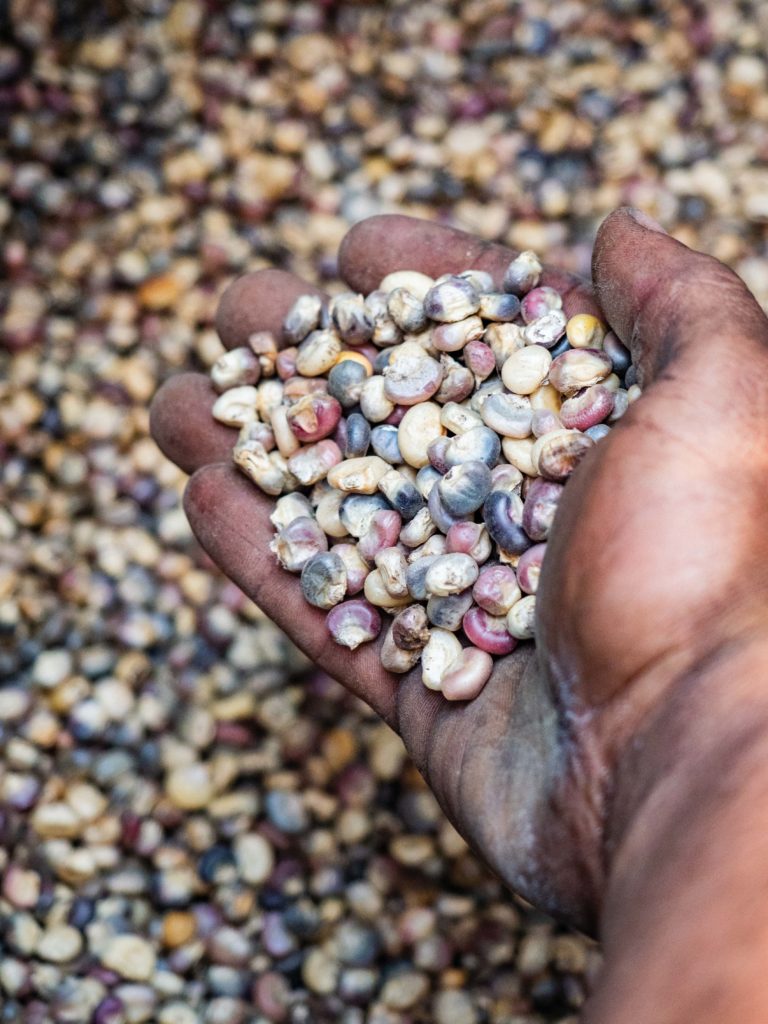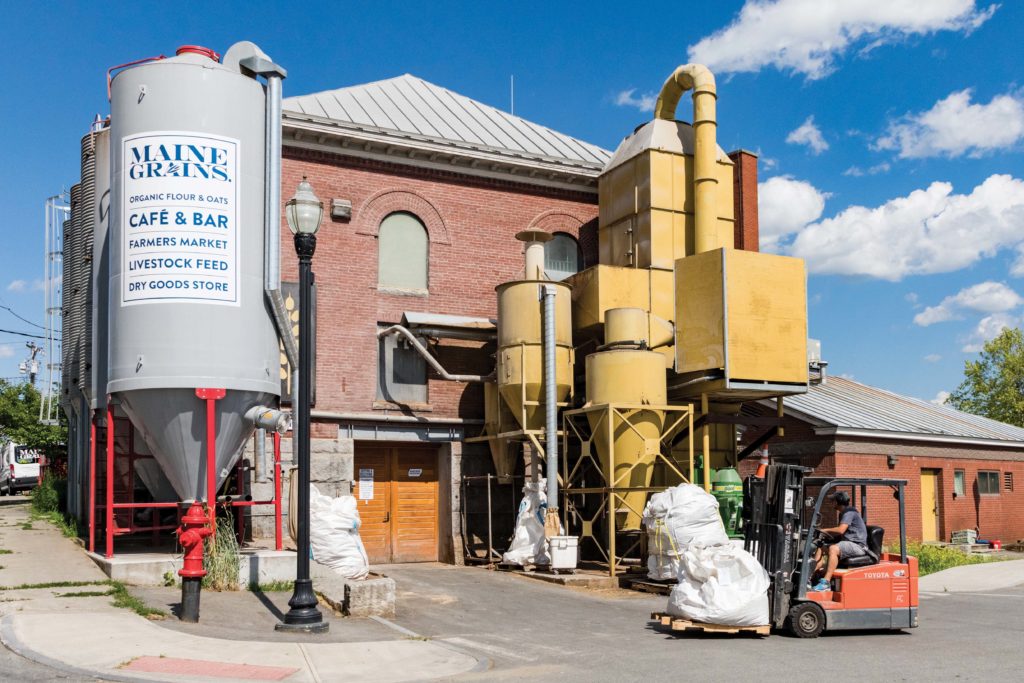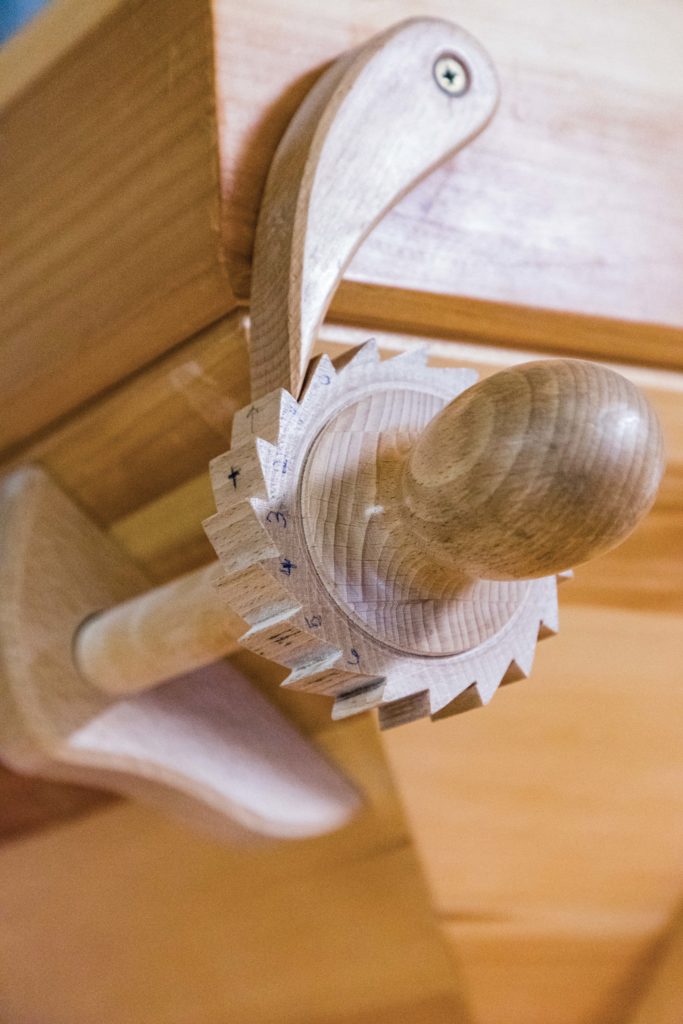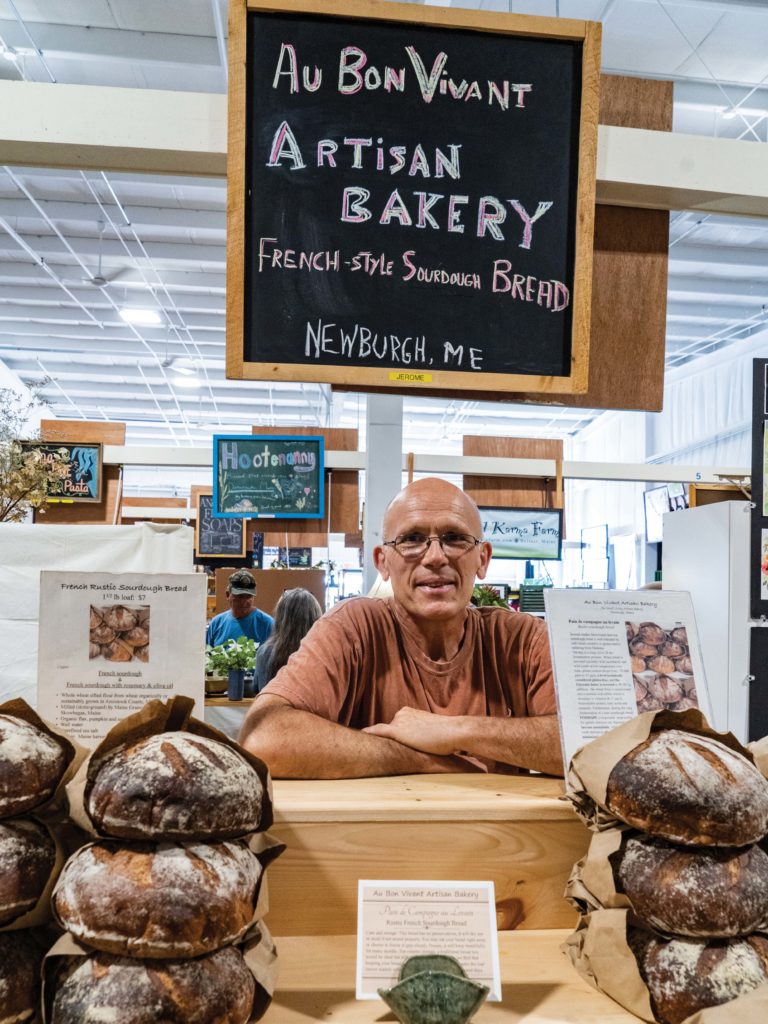Flour Power
From farm field to milestone to hot oven, we follow the wheat, rye, and oats to Maine Grans in Skowhegan–and sample some of the locally grown, organic grains that are changing the tastes and texture of Maine’s flour and bread.

Flour Power
From farm field to millstone to hot oven, we follow the wheat, rye, and oats to Maine Grains in Skowhegan–and sample some of the locally grown, organic grains that are changing the tastes and texture of Maine’s flour and bread.
Issue: September 2019
By: Sandy Lang
Photography by: Peter Frank Edwards
At the end of the July Fourth weekend, Sean O’Donnell has finished cutting 30 acres of hay in Parkman, about 40 miles northwest of Bangor. In the final couple hours of daylight, he hops off the tractor and heads back to the barns on the 400 acres of Rusted Rooster Farm, which he plants and tills with his wife, Sandra.
Theirs is a lively farmyard, with several of the family’s collies and a beagle threading through. Sean’s two brothers and his parents live just down the road, and the couple’s four young children and some of their cousins are playing near clumps of wildflowers and stacks of tractor tires—a few of the kids are barefoot, trying to sneak up on a spot where deer sometimes sleep. In the softer, day’s-end light, young turkeys and chickens, some still with more fuzz than feathers, skitter about, and a donkey munches grass on a hill beyond the fence line.

A handful of dried flint corn. 
Farmer Sean O’Donnell checking on a field of sirvinta wheat, one of the heritage grains he’s growing organically at Rusted Rooster Farm in Parkman.
In a dirt-dusted T-shirt and jeans, O’Donnell looks across the tightly packed rows of the nearest field he’s planted. Full and green, the nearly shoulder-high crop of sirvinta wheat is looking really good, he says. “Healthy soil means less problems.”
Just 30 years old, O’Donnell, the grandson of an Aroostook County potato farmer, has been working on farms since he was 12, and he’s participated in wheat-breeding trials for Cornell University, yet he is humble about what he knows. It was a lark, he says, when he planted the heirloom variety a full month earlier than usual last summer, but the chance he took on sirvinta looks to have paid off. He’s excited about the robust growth compared to sections he planted later, and looks forward to a higher yield per acre at harvest time in a few weeks.

The fields are on an undulating landscape with woods at the edges, and the air smells fresh and, well, green. No pesticides or synthetic fertilizers are involved in the grain growing here; instead, O’Donnell says, “I manipulate things to add more life. I don’t want bare, dead soil.” That means spending five years to get a new field ready for planting—enhancing the soil through crop rotation and sometimes adding seaweed or manure, using no-till planting methods, and letting the vetch, peas, and mustard grow into the rows as companion crops.
O’Donnell points to where he’s planted red fife wheat (a European wheat brought to Canada in the 1800s), a heritage variety of Native American flint corn, buckwheat, millet, oats, rye, and barley—some 80 acres of grains in all.
At a row’s end, I reach out to run my hands across the top of the soft plumes of wheat berries on the sirvinta stalks and think, We’ve found it. The grain starts here.
Milling Again
In the sunshine on a different summer day, about 35 miles away in Skowhegan, “volunteer” plants of oats and wheat are growing tall at the edge of sidewalks and parking lots along Court Street—perhaps from seeds fallen from Sean O’Donnell’s truck, or from the truck of another of the 20 or so Maine farms that grow and sell grain to Maine Grains. Farmers bring sacks of harvested grain to the loading door of the enterprising mill, which opened in 2012 and is helping to reestablish grain growing and milling in Maine. Grain mills once flourished in this region, but Skowhegan’s last operating grain mill closed in the 1950s. (On the drive to Rusted Rooster Farm, we passed the Dexter Grist Mill, which was open from the 1800s to the 1960s and is now a museum.)
The whooshing sound photographer Peter Frank Edwards and I hear while walking beside towering silos at the mill is the pneumatic system vacuuming grains up to the second or third floor for processing. Inside, machinery built of metal and wood is humming, and there’s a grassy, nutty smell in the air as wheat berries pass through the contraptions to finish as streams of creamy-colored flour.

Today, the grist mill sorts, cleans,
and mills wheat, oats, barley, and other grains grown in Maine and elsewhere in the Northeast
Amber Lambke, at bottom left, is one of
the cofounders of Maine Grains.
Maine Grains got its start when Amber Lambke, a speech pathologist who had been helping to expand the farmers’ market, began to learn more about grain from local bakers. She helped start the annual Kneading Conference in Skowhegan in 2007, which brings together bread bakers, farmers, millers, and researchers in the field of growing and using grains. Baker Michael Scholz, cofounder of the Kneading Conference, had been buying a heritage wheat variety, red fife, from a mill in New Brunswick, and one day Lambke joined him on a visit to the Canadian mill. Impressed by the simplicity of the process, from the traditional millstone equipment to the local farm sources, and by the mill’s more flavorful flour, Lambke wondered if a similar operation could be started in downtown Skowhegan’s old Somerset County Jail building, which was still home to inmates at the time but slated to close. In 2009 Lambke and Scholz purchased the former jail building.
The Jail Transformed
Today in the retooled facility that’s now the grist mill for Maine Grains, just-milled flour is bagged for distribution in the former jail cafeteria. The old cell blocks upstairs are offices. On rotating round stones that are four feet across, grains are ground into flours slowly, at temperatures cool enough to preserve the freshness of their natural oils and their vitamin content. With its focus on freshly milled organic grains sourced regionally—including rye, oats, flint corn, spelt, barley, buckwheat, yellow pea, farro, and wheat—Maine Grains has become a hub and an essential part of restoring what Lambke describes as the “grain economy”: regional grain farming, milling, baking, and brewing. O’Donnell started planting wheat the year before the mill opened, and he says that the organically grown grains are so sought after in today’s marketplace that he can readily sell everything he grows, either to be milled for use in bread or beer or as seed for other interested farmers.

On pizza night at the Miller’s Table, sliding a sourdough crust pie from the oven, made by Skowhegan-based Maine
Wood Heat Company.
Flour, cookbooks, and kitchen gear for sale in the Dry Goods Store at Maine Grains.
Five days each week at Maine Grains, the milling crew produces made-to-order flour and milled grains for its rapidly growing customer base of bakeries, restaurants, and breweries in New England and New York; just in Maine, more than 30 breweries are now customers. A leader is Portland-based Allagash Brewing, which is increasing its use of Maine-grown grains each year and has pledged to use one million pounds of locally grown and processed grain per year by 2021. Focusing on wholesale accounts and distributors throughout New England and the Northeast, Maine Grains’ business has grown 350 percent over the past five years. And even the chaff and dust are valuable for compost and livestock feed. The mill also sells two-pound and five-pound bags of organic and heritage-variety milled grains and flours directly to home bakers online and from its retail shop inside the Skowhegan building, and from a growing number of grocery stores and shops in New England. Retailers in Maine include several Hannaford locations, Whole Foods Market in Portland, Lincolnville General Store, Tiller and Rye in Brewer, and the coops in Belfast, Blue Hill, and Portland.
Last year, the Miller’s Table cafe opened at Maine Grains, with a menu featuring food made from grains and other local and seasonal ingredients. In a wood-fired oven, pizzas are made to order using dough from the Bankery in Skowhegan, and bread and pies are made by Night Moves in Biddeford. Cheese comes from the Crooked Face Creamery, which just moved next door, into the jail’s former laundry room. Freshmade pasta, grain bowls, and slab sandwiches are served along with wine, local beers, and cocktails. “The mill has become a destination during the Skowhegan Farmers’ Market, and when we have tours, people can stay for a meal and make of day of it,” Lambke says.
Knead to Bake

About 50 miles from the mill on the midcoast, you can’t miss noticing the orderly stack of round sourdough loaves that Jerome Rigot arranges every Saturday morning at the United FarmersMarket of Maine in Belfast—unless you arrive too late. Using flour he buys from Maine Grains and a slow-rise, natural fermentation process, the French-born baker makes 62 loaves each week for his Au Bon Vivant Artisan Bakery stand at the weekend market. Lately, he’s been selling out in less than two hours.
If he had a larger oven, he’d bake more of the bread, made from a dough of whole wheat flour, chlorine-free well water, and unrefined sea salt, along with organic flax, sunflower, and pumpkinseeds. He doesn’t add commercially produced yeast, instead letting the dough rest and rise for 12 to 18 hours so that wild yeast activates the ingredients. “I try to get the best flour I can,” he says, noting that he just picked up his monthly order from Maine Grains, and the flour was milled a day or two before he arrived. “It’s from wheat grown in Aroostook County without pesticides, and it’s stone-ground, which is very important to me because all of the germ in the bran hasn’t been removed.”

On a Saturday morning in Belfast baker Jerome Rigot sells his fresh-baked bread made with Maine Grains flour at the United Farmers Market of Maine. 
Baking at home with red fife and sifted wheat flours from Maine Grains.
Rigot says that, growing up in the Loire Valley of France, he and his family ate bread three times a day, and when he moved to the United States, he started baking at home to maintain the tradition.
I buy a loaf, or miche, as Rigot calls it, and as soon as we’re back at our house I cut through the dark brown crust and tear a piece from the chewy center. Because of the natural fermentation, the sourdough taste differs depending on where the bread’s baked, Rigot had said. I find the taste and texture much more substantial and interesting than packaged, branded breads from the grocery store—the fresh-grown taste is real, nutrient-rich, and delicious. And Peter Frank and I do as Rigot recommended: we dip pieces of the bread in a good olive oil.
After experiencing the O’Donnells’ farm and the Skowhegan mill and the smells and tastes of Miller’s Table pizza and Rigot’s bread, we’re inspired to do some baking ourselves. At Maine Grains, we’d bought bags of sifted wheat and red fife wheat flour, and we follow a recipe for a 50/50 blend of the two. The red fife has a satisfying heft and grit. After two rises, we shape the dough into two rounds for baking in a hot oven at 475 degrees. In a nod to European-style sourdough, I have a package of Président butter from France open on the table, at the ready. At the ding of the timer, we lift the bread out of the oven, admiring its deeply brown crust and an earthy, nutty aroma.
Recipes always suggest waiting for bread to cool, but I don’t have that kind of resolve. It’s never going to be better than right now, I think, little puffs of steam rising when we tear into the hot boule and smear on a pat of butter. The week’s conversations and thinking about local grains have come to this moment. Nice chew, full of flavor, and I already want more.
Visiting Maine Grains
Housed in the former Somerset County jail at 42 Court Street in Skowhegan, Maine Grains offers frequent free tours of the mill. Tour schedules can be found at mainegrains.com. Visitors may also stop by the Dry Goods Store, which is stocked with flour and grains, cookbooks, linens, and baking and kitchen gear. Just across the hall is the Miller’s Table at Maine Grains, a cafe and bar with indoor and patio seating that serves wood-fired pizzas, sandwiches, grain bowls, pasta, pie, beer, wine, and cocktails in a seasonal menu focused on local ingredients and Maine-grown grains. Hours and more details at millerstable.com.
Founded in Skowhegan, the annual Kneading Conference is an international gathering of bakers, farmers, millers, and grain researchers each year in July. More information can be found at kneadingconference.com.






